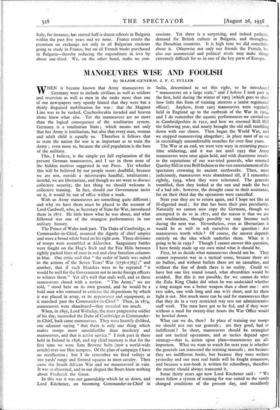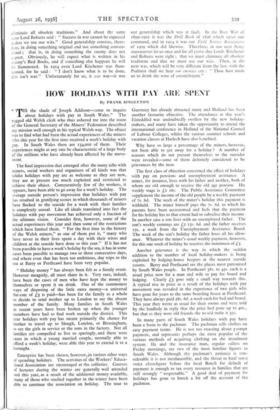MANOEUVRES WISE AND FOOLISH
By MAJOR-GENERAL J. F. C. FULLER
WHEN it became known that Army manoeuvres in Germany were to include civilians as well as soldiers and reservists as well as men in the ranks more than one of our newspapers very openly hinted that they were but a thinly disguised mobilisation for war : that the Maginot Line was to be rushed, Czechoslovakia invaded and heaven alone knew what else. Yet the manoeuvres are no more than the logical consequence of the totalitarian system.
Germany is a totalitarian State ; which means not only that her Army is totalitarian, but also that every man, woman and adult child is equally so. Therefore it follows that to train the nation for war is as important as to train the Army ; even more so, because the civil population is the base of the military.
This, I believe, is the simple yet full explanation of the present German manoeuvres, and I see in them none of the hidden motives suggested in our Press. Yet whether this will be believed by our people seems doubtful, because we are not, outside a microscopic handful, totalitarians ; instesd, we are libertarians, and though we are wont to discuss collective security, the last thing we should welcome is collective training. In fact, should our Government insist on it, it would be out of office within a week.
With us Army manoeuvres are something quite different ; and why we have them must be placed to the account of Lord Cardwell, who, as Secretary of State for War, introduced them in 187r. He little knew what he was about, and what followed was one of the strangest performances in our military history.
The Prince of Wales took part. The Dulte of Cambridge, as Commander-in-Chief, assumed the dignity of chief umpire and wore a broad white band on his right arm. Three divisions of troops were assembled at Aldershot. Sanguinary battles were fought on the Hog's Back and the Fox Hills between tightly packed lines of men in red and close battalion columns in blue. One critic said that " the order of battle was suited to the actions of the Seven Years' War (1756-1763) ;" and another, that if such blunders were to be repeated " it would be well for the Government not to invite foreign officers to witness them." Yet all's well that ends well, and so these manoeuvres closed with a review. " The Army," we are told, " stood here on its own ground, and he would be a bold man who ventured to criticise the dispositions by which it was placed in array, or its appearance and equipment, as it marched past the Commander-in-Chief." Then, in 1874, manoeuvres were abandoned—they revealed too much.
When, in 1895, Lord Wolscley, the most progressive soldier of his day, succeeded the Duke of Cambridge as Commander- in-Chief, back came manoeuvres. They were heartily disliked, one adjutant saying " that there is only one thing which makes troops more unsoldicrlike than musketry and manoeuvres, and that is active service." I took part in those held in Ireland in. 1898, and my chief memory is that for the first time we wore Sam Browne belts (now a world-wide article) over our blue jumpers. Of the plan of campaign I have no recollection ; but I do remember we fired volleys at 200 yards' range and formed squares to meet cavalry. Then came the South African War and we manoeuvred in vain. It was so abnormal, and to our disgust the Boers knew nothing about Frederick the Great.
In this war it was our generalship which let us down, and Lord Kitchener, on becoming Commander-in-Chief in India, determined to set this right, so he introduced " manoeuvres on a large scale," and I believe I took part in the first, held during the winter of 1903 (which goes to show how little this form of training interests a junior regimental officer). Anyhow, from 1903 manoeuvres were regularly held in England up to the outbreak of the War in 1914, and I do remember the aquatic performances we carried out in Cambridgeshire in 1912, and how we stormed Brill Hill the following year, and nearly brought the old mill tumbling down with our cheers. Then began the World War, and we stopped manoeuvring altogether; in place most of us sat in exceedingly uncomfortable trenches for over four years.
The War at an end, we were very wary in restarting peace- time soldiering, and it was not until 1925 that Army manoeuvres were once again held, and with disastrous results to the reputations of our war-tried generals, who stormed Quarley Hill in true Brill fashion to the vast entertainment of the spectators crowning its ancient earthworks. Then, most judiciously, manoeuvres were abandoned till, if I remember rightly, 1934, when they were reinstated. The generals trembled, then they looked at the sun and made the best of a bad job ; however, the drought came to their assistance, for on their third day the operations were cancelled.
Next year they are to return again, and I hope not like an ill-digested meal ; for that has been their past peculiarity. Naturally we cannot now copy the Germans, though we attempted to do so in 1871, and the reason is that we are not totalitarians, though possibly we may become such during the next war. Nevertheless, even as libertarians it would be as well to ask ourselves the question : Are manoeuvres worth while ? Of course, the answer depends entirely on the idea which underlies them. What is it going to be in 1939 ? Though I cannot answer this question, I have firmly made up my own mind what it should be.
First, let us decide what manoeuvres should not be. They cannot represent war in a tactical sense, because there are no bullets, and without bullets there are no casualties, and without the fear of death there is no reality. Could we have but one live round issued, what absurdities would be avoided. But this is not possible, for we cannot do what the Zulu King Chaka did when he was undecided whether a long assagai was a better weapon than a short one : arm two sides, one with long and one with short, and let them fight it out. Not much more can be said for manoeuvres than that they do in a very restricted way test out administrative staff work. The men have got to be fed, and if they went without a meal for twenty-four hours the War Office would be howled down.
What can we do, then? In place of training our troops we should test out our generals ; are they good, bad or indifferent ? In short, manoeuvres should be strategical and not tactical operations, and as tactics depend upon strategy—that is, action upon plan—manoeuvres are all- important. What we want to watch for next year is whether the generals can transcend the training manuals ; not because they are indifferent books, but because they were written yesterday and our next real battle will be fought tomorrow, and because a text-book is written for schoolboys, therefore the master should always transcend it.
Some thirty years ago now Lord Kitchener said : " We must follow a system of training for war suited to the vastly changed conditions of the present day, and steadfastly eliminate all obsolete traditions." And about the same tune Lord Roberts said : " Success in war cannot be expected unless we use our wits." , Good generalship consists, there- fore, in doing something original and not something conven- tional ; that is, in doing something the enemy does not expect. Obviously, he will expect what is written in his enemy's Red Books, and if something else happens he will he flummoxed. In 1914 even Lord Kitchener was flum- moxed, for he said : " I don't know what is to be done, this isn't war." Unfortunately for us, it was war—it was our generalship which was at fault. In the Boer War of 1899-1902 it was the Drill Book of 1896 which upset our command, and in 1914 it was our Field Service Regulations of 1909 which did likewise. Therefore, in our next Army manoeuvres let us once and for all prove that Lords Kitchener and Roberts were right ; that we must eliminate all obsolete traditions and that we must use our wits. Then, in the next war, which will be very different from the last, with the Psalmist shall we hear our enemies cry : " Thou hast made us to drink the wine of astonishment."



































 Previous page
Previous page